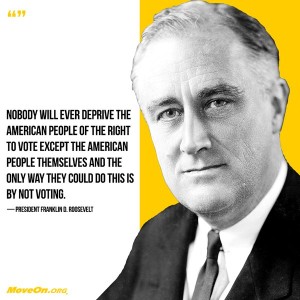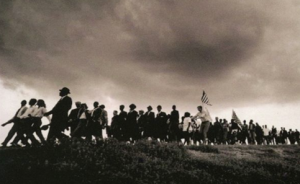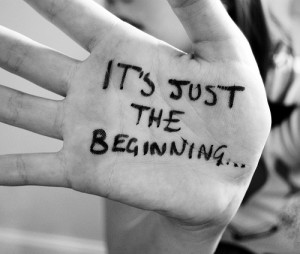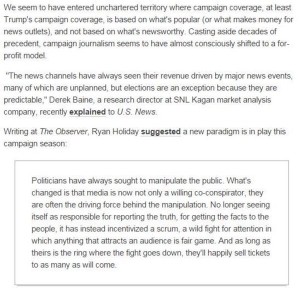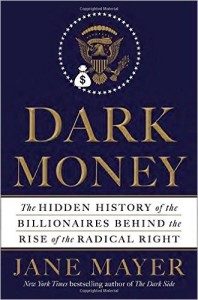Yes.
March 30, 2016‘Vote. Go with friends. Make it fun.’
March 28, 2016Sarah Silverman explains why she’s voting for Bernie Sanders and why, whomever you vote for, you should vote.
The wisdom of millennials.
March 27, 2016‘I hope that we can learn to see that dignity that’s in all of us, that divinity that comes when we organize together, when we meet each other face-to-face, and even sometimes through a chat room — how to tell those stories. How to hold up those moments where we find our agency and our ability to make a change. That’s what I’m looking for. And that’s what I hope, more than anything, to contribute.
[…]
Could the growing number of non-religious young people be a force for the renewal of spiritual traditions? How might the internet of the future look utterly different from the internet of now? And what did the Occupy movement really tap into, and what has it become below the radar? With Nathan Schneider, we explore the wisdom of a millennial generation public intellectual on the emerging fabric of human identity.’
—
is a scholar-in-residence of media studies at the University of Colorado Boulder. He is the author of God in Proof: The Story of a Search from the Ancients to the Internet and Thank You, Anarchy: Notes from the Occupy Apocalypse. He is a regular columnist for Vice magazine and America, the national Catholic weekly. He is currently co-editing a book on democratic business models for online platforms.
On Being:
http://www.onbeing.org/program/nathan-schneider-the-wisdom-of-millennials/6911
‘Let Donald Trump be our unifier.’
March 23, 2016What will we do and what lengths will we go to, what collective imagination will we employ, what mighty love will we summon to ensure the ending of this violence, this hate, this destruction of our mother earth, this grotesque inequality of wealth, this mad and ferocious drive to our end?
Here’s what Donald Trump is not:
He is not us.
He is not all of us.
He is not the best of us.
He is not inevitable.
Let us take Trump at his word. Let him be our Unifier.
—
Full article, from The Guardian: http://www.theguardian.com/commentisfree/2016/mar/23/donald-trump-campaign-america-unifier-eve-ensler?CMP=share_btn_fb#_=_
Seth.
March 20, 2016‘That’s an easy mistake to make and a tempting trap to fall into.
It’s unlikely you have no choice. More likely: There’s no easy choice. No safe choice that also embraces your potential. No choice you can make that doesn’t cause short-term misery in exchange for a long-term benefit.
When we say we have no choice, we feel trapped and we are powerless. That’s no way to do our work every day.
Do it or don’t do it. It’s up to you.’
-Seth Godin
Spring.
March 19, 2016Power Path
~
‘Spring Equinox is Saturday, March 19 at 10:30PM Mountain Daylight Time. (MDT) Honor this transition by completing something that needs it and by consciously intending for the birth of something new. What wants to be fired up right now? What needs a bit more power? What are you finished with?
This is a potent time between two powerful eclipses and what you focus on around this Equinox time will carry great power into the future. Even if it is just an idea or a decision that you commit to following through with, take the time to explore it and give it some attention. This is also a good time to try something new, do something out of your comfort zone and stretch your container a little bit.
Acknowledge this time as well as your own process with a ceremony using the elements of fire, water, air and earth. If you are releasing something, burn or bury it. Work with breath and water to bless and bring in something new.’
Would you rather…
March 18, 2016Seth Godin:
‘Spend an hour with a good friend in intimate conversation.
spend an hour engaging with your team on the next significant leap in your strategy,
or spend an hour with your smart phone, grooming your social media presence and your inbox?
Good news, you can.’
Small acts…can transform the world.
March 16, 2016Change in the microcosm…in community. This I believe.
—
Howard Zinn said:
‘Revolutionary change does not come as one cataclysmic moment (beware of such moments!) but as an endless succession of surprises, moving zigzag toward a more decent society.
We don’t have to engage in grand, heroic actions to participate in the process of change. Small acts, when multiplied by millions of people, can transform the world.
To be hopeful in bad times is not just foolishly romantic. It is based on the fact that human history is a history not only of cruelty, but also of compassion, sacrifice, courage, kindness. What we choose to emphasize in this complex history will determine our lives.
If we see only the worst, it destroys our capacity to do something. If we remember those times and places — and there are so many — where people have behaved magnificently, this gives us the energy to act, and at least the possibility of sending this spinning top of a world in a different direction.
And if we do act, in however small a way, we don’t have to wait for some grand utopian future. The future is an infinite succession of presents, and to live now as we think human beings should live, in defiance of all that is bad around us, is itself a marvelous victory.’
(A Power Governments Cannot Suppress)
Waiting for perfect.
March 14, 2016‘You’ve permitted magical to walk on by. Not to mention good enough, amazing and wonderful.
Waiting for the thing that cannot be improved (and cannot be criticized) keeps us from beginning.
Merely begin.’
-Seth Godin
Maria Papova.
March 13, 2016‘Mastery is not merely a commitment to a goal, but to a curved-line, constant pursuit.’
-Sarah Lewis
(‘Sarah received her bachelor’s degree from Harvard, an M. Phil from Oxford University, and her Ph.D. from Yale University in the History of Art.’)
Words matter.
The Guardian
Neoliberalism has hijacked our vocabulary.
Instead of an unrelenting quest for growth, might we not ask the question, in the end: “What is an economy for?”, “What do we want it to provide?”
Our current imaginings endow the market and its associated forms with a special status. We think of “the economy” in terms of natural forces, into which we occasionally intervene, rather than in terms of a whole variety of social relations that need some kind of co-ordination.
[…]
Above all, we need to bring economic vocabulary back into political contention, and to question the very way we think about the economy in the first place. For something new to be imagined, let alone to be born, our current economic “common sense” needs to be challenged root and branch.
http://www.theguardian.com/commentisfree/2013/jun/11/neoliberalism-hijacked-vocabulary
Media Matters
March 12, 2016What’s different about this election? A shift to a for-profit model of campaign journalism…
Revolution…not evolution.
New York Times:
(Editorial Board)
‘Revolutions are typically bottom-up, not top-down, events. Mr. Sanders’s campaign is powered by $30 contributions and an army of young volunteers, but there are not enough elected office holders in Congress or in statehouses to carry out his revolution through new laws or policies. And that’s the big difference between running an inspiring campaign and actually governing.
[…]
The mistake is thinking that we get behind a progressive candidate for president, and that will solve all our problems.
[…]
Mr. Sanders’s own political career illustrates what can happen when a revolutionary has no ground troops. For 25 years in Congress, Mr. Sanders has held fast to his progressive message and principles. But he hasn’t gotten many big things done. As an uncompromising political independent, his outsider status has largely prevented him from attracting the support that would be needed among Democrats to turn into law his liberal ideals on health care, on college education and on fighting poverty and climate change.
One need only look to the legislative setbacks for President Obama to see what happens when transformative ideas hit an intransigent Congress.
[…]
As a result, Mr. Obama has presided over the biggest loss of congressional Democrats in modern political history — 13 Senate seats and 69 House seats. Republicans now hold 31 governorships, many more than when Mr. Obama took office. State legislatures, too, have had a surge in Republican control.
The Democratic Party recognizes the problem, but whether it can alter the trend is another matter. Raul Alvillar, the national political director for the Democratic National Committee, says the party has demographics on its side, as a wave of young people reach voting age, and the party, through a series of training initiatives, is trying to inspire them to run for local office.
Ilya Sheyman, the executive director of MoveOn.org, a political advocacy and action group that has endorsed Mr. Sanders, views his candidacy as “a reaction to the Tea Party standing in the way of everything the president wants to do, and a coming of age of a new wave of voters.” He is confident that movements like Occupy Wall Street, the Fight for $15 minimum-wage campaign, and Black Lives Matter will eventually propel young progressives into elective office. He credits Occupy Wall Street with putting the issue of wealth inequality into public discourse, and “now I think what we’re seeing is the electoralization of these issues.”
Mr. Sanders’s supporters say his election will inspire more such candidacies, giving him the congressional backup he needs. But given Democrats’ problems on the state and local level, that could take years — and that’s evolution, not revolution.’
Seth Godin.
‘Are there primary voters who say, “I know that he craves attention, hustling and manipulating to sell emotional promises, not realistic action, but I’m going to vote for him anyway, because it makes me feel powerful to do so…”?
As soon as that self-awareness kicks in, it’s possible to be more discerning about what you believe and why.
Or are there mindful people who say, “there’s no clear right answer in this conflict, but my people, my folks, we have always supported this side, so I’m going to keep doing that, because breaking with them is too painful…”?
As soon as you ask that question, it’s a lot easier to have a civil, productive conversation, because instead of wearing yourself out arguing tropes, you can talk about the actual issue, which is belonging to a tribe. We can talk about how we work through the cultural change to get to a new place, not have an argument about history.
Marketing works. It’s powerful. We’re able to acknowledge that and see it for what it is without giving up what we choose to believe.
We can create better decisions and more amity by being clear with ourselves and others about how marketing is changing what we believe (and vice versa).
It’s a lot harder to be manipulated if you accept that there’s a manipulator, and it’s a lot easier to see a path forward if you acknowledge that you weren’t looking for one before.’
What does $90 (B) buy?
“Mayer is. . . [a] writer whose reporting can leave a reader breathless. . . . I urge you to read Dark Money.”
—Bill Moyers
“Jane Mayer’s Dark Money is utterly brilliant and chilling — no matter how much you think you already know. . . . Read it!”
—Naomi Klein, bestselling author of The Shock Doctrine: The Rise of Disaster Capitalism and This Changes Everything: Capitalism vs the Climate
“Jane Mayer’s Dark Money. . . is absolutely necessary reading for anyone who wants to make sense of our politics. Lay aside the endless punditry about Donald’s belligerence or Hillary’s ambition; Mayer is telling the epic story of America in our time.”
—The New York Review of Books
“Mayer believes that the Koch brothers and a small number of allied plutocrats have essentially hijacked American democracy, using their money not just to compete with their political adversaries, but to drown them out. . . . Dark Moneyemerges as an impressively reported and well-documented work. . . . ”
—From the cover of the Times Book Review
“Revelatory. . .persuasive, timely and necessary. . . . [O]nly the most thoroughly documented, compendious account could do justice to the Kochs’ bizarre and Byzantine family history and the scale and scope of their influence.”
—The New York Times
“[Dark Money] could inspire a more intense discussion about the impact of this wealthy conservative cadre on the Republican Party and the recent course of American politics.”
—Washington Post
“[B]ombshells explode in the pages of Dark Money, Jane Mayer’s indispensible new history . . . .combines her own research with the work of scores of other investigators, to describe how the Kochs and fellow billionaires like Richard Scaife have spent hundreds of millions to ‘move their political ideas from the fringe to the center of American political life.’”
—The Guardian
—
‘The network has brought together some of the richest people on the planet. Their core beliefs—that taxes are a form of tyranny; that government oversight of business is an assault on freedom—are sincerely held. But these beliefs also advance their personal and corporate interests: Many of their companies have run afoul of federal pollution, worker safety, securities, and tax laws.
The chief figures in the network are Charles and David Koch, whose father made his fortune in part by building oil refineries in Stalin’s Russia and Hitler’s Germany. The patriarch later was a founding member of the John Birch Society, whose politics were so radical it believed Dwight Eisenhower was a communist. The brothers were schooled in a political philosophy that asserted the only role of government is to provide security and to enforce property rights.
When libertarian ideas proved decidedly unpopular with voters, the Koch brothers and their allies chose another path. If they pooled their vast resources, they could fund an interlocking array of organizations that could work in tandem to influence and ultimately control academic institutions, think tanks, the courts, statehouses, Congress, and, they hoped, the presidency. Richard Mellon Scaife, the mercurial heir to banking and oil fortunes, had the brilliant insight that most of their political activities could be written off as tax-deductible “philanthropy.”
These organizations were given innocuous names such as Americans for Prosperity. Funding sources were hidden whenever possible. This process reached its apotheosis with the allegedly populist Tea Party movement, abetted mightily by the Citizens United decision—a case conceived of by legal advocates funded by the network.’ (From Amazon)
David Whyt
So that one day you realized, that what you wanted
had actually already happened, and long ago,
and in the dwelling place in which you lived before you began,
and that every step along the way, you had carried
the heart and the mind and the promise,
that first set you off and then drew you on, and that,
you were more marvelous in your simple wish to find a way
than the gilded roofs of any destination you could reach…
…
Excerpt from ‘Santiago’
From PILGRIM: Poems by David Whyt
‘…faith, while change moves slowly along.’
‘Rebecca Solnit Explains Things to Us…’
There’s this idea that political engagement is some sort of horrible, dutiful thing you do, like cleaning the toilet or taking out the garbage. But it can be the most fantastic thing you do. It can bring you into contact with hope, with joy, with a sense of deep connection, with what Martin Luther King called the “beloved community.” Disconnection from a larger sense of purpose and agency, from community and civil society, and from hope are huge factors in unhappiness.
Hating on people has never been a great form of social change, so far as we know.
I have preferences and they’re probably not that hard to guess. But with Obama, people so completely put their faith in: “Oh, we’ll elect this magic, amazing super-human and then we’ll all go home and do absolutely nothing.” The movement that put Obama in office was powerful enough to make really profound change, but everyone went home because they thought he’d do it.
That’s what you see with Bernie Sanders: this infatuation with an almost savior-like figure who will do it all. No, actually, massive grassroots movements need to exist the day after the election. Electoral politics are dismal; I’m more interested in grassroots power, popular power.
[This post originally appeared at In These Times.]
In a dispatch from Paris for Harper’s, writer and activist Rebecca Solnit called the recent climate agreement negotiated there “miraculous and horrible.” This tension between the exciting and the awful, the transformative and the terrifying, motivates her book Hope in the Dark: Untold Histories, Wild Possibilities. Initially written in response to the Iraq War, the book will be re-released this month with a new section on climate change.
Bill Moyers
http://billmoyers.com/story/rebecca-solnit-explains-things-to-us/
‘Everyone is mixed.’
March 10, 2016‘Race is a social construct.’
From YES! Magazine
Filmmakers offer a glimpse into the “gray area” of being mixed race in America.
‘In this video from Evoking the Mulatto—a multiplatform project exploring black mixed identity in the United States—young people talk about the words used to describe their mixed race heritage and how those words affect their lives and sense of self.
Of course, the question is twofold. How do mixed race people perceive themselves, and how do others perceive them?’
